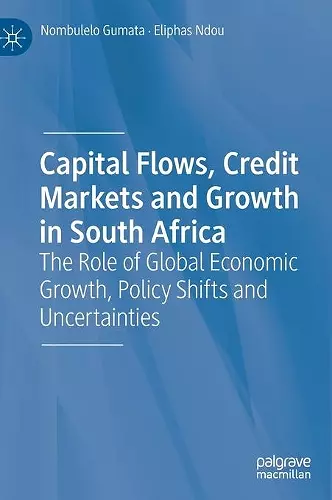Capital Flows, Credit Markets and Growth in South Africa
The Role of Global Economic Growth, Policy Shifts and Uncertainties
Nombulelo Gumata author Eliphas Ndou author
Format:Hardback
Publisher:Springer Nature Switzerland AG
Published:2nd Jan '20
Currently unavailable, and unfortunately no date known when it will be back
This hardback is available in another edition too:
- Paperback£59.99(9783030308902)

This book examines the dynamics in capital flows, credit markets and growth in South Africa. The authors explore the role of global economic growth, policy shifts and various economic policy uncertainties. Central banks in advanced economies are engaged in unconventional monetary policy tools such as balance sheet policies, negative interest rates and extended forward guidance to assist them to meet their price, financial and macro-economic stability objectives. This book determines whether BRICS GDP growth is a source of shocks or an amplifier of global growth shocks. The authors find that global economic growth and policy uncertainty reinforce each other via capital flows, credit conditions and business confidence on the domestic economy. Furthermore, they demonstrate that there is momentum in the changes in the spread between the repo rate and federal funds rate. In addition, global real policy rates impact domestic GDP growth and labor market conditions. The authors examine the economic costs of capital flow surges, sudden stops and elevated portfolio volatility shocks and their interaction with GDP growth and credit. They show that equity and debt inflows matter in the attainment of the price stability mandate. Moreover, business confidence transmits sovereign credit ratings upgrades and downgrades shocks to the real economy via GDP growth, the cost of government debt and borrowing to impact credit growth. High GDP growth increases the likelihood of sovereign credit ratings upgrades, hence policymakers should implement pro-growth policies. Inflation regimes impact the transmission of positive nominal demand shocks to the price level. Low and stable inflation (inflation below 4.5 per cent) reduces the pass-through of positive nominal demand shocks to inflation.
ISBN: 9783030308872
Dimensions: unknown
Weight: unknown
385 pages
2019 ed.